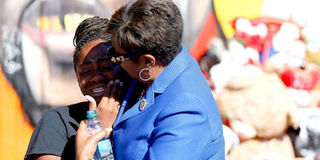No charges over black man's police shooting in Louisiana

BATON ROUGE, LA - MAY 02: A family member reacts to news that the U.S. Justice Department had declined to charge Baton Rouge police officers in the fatal shooting of Alton Sterling on May 2, 2017 in Baton Rouge, Louisiana. | PHOTO | Sean Gardner |Getty Images | AFP |
What you need to know:
- Louisiana police will not face federal charges over the shooting of a 37-year-old African American man whose death sparked widespread protests.
- Alton Sterling's videotaped shooting by police in Baton Rouge was one of a series of police killing of black men that triggered nationwide protests.
- At the close of the investigation, the Justice Department said it found "insufficient evidence to support federal criminal charges" against either officer.
WASHINGTON
Louisiana police will not face federal charges over the shooting of a 37-year-old African American man whose death sparked widespread protests, the US Justice Department said Wednesday, in a decision slammed by rights groups as a message of impunity.
Alton Sterling's videotaped shooting in Baton Rouge was one of a series of police killing of black men that triggered nationwide protests spearheaded by the "Black Lives Matter" movement.
Civil rights groups said the decision not to bring charges in the emblematic case — the first taken under Donald Trump's incoming attorney general, Jeff Sessions — sent a clear signal that "black lives don't matter."
Sterling was shot to death July 5, 2016 in a scuffle with two officers, Blane Salamoni and Howie Lake, outside a convenience store where he had been selling CDs.
During a 10-month probe, FBI agents and prosecutors reviewed images of the incident captured by body cameras, cellphones and store surveillance cameras as well as witness accounts and other evidence.
INSUFFICIENT EVIDENCE
At the close of the investigation, the Justice Department said it found "insufficient evidence to support federal criminal charges" against either officer.
Members of Sterling's family were grief-stricken at the news.
"It hurts so bad," Sandra Sterling, the victim's aunt, told a local television station, choking back tears.
"All of this was for nothing."
According to investigators, Officer Salamoni, shouting "going for a gun," shot Sterling three times in the chest and then three more times in the back in an encounter that lasted less than 90 seconds.
INDEPENDENT WITNESS
The Justice Department said Lake subsequently found a .38 caliber revolver in Sterling's back pocket. No independent witness account has corroborated the police claim that Sterling reached for the gun.
Nonetheless, the probe concluded that — although videos show Sterling's right hand was not in or near his right pocket — he was continuing to move, even after being shot three times.
At that point, it said, Officer Salamoni was lying on the ground, facing Sterling's back.
"Given these circumstances, the evidence cannot establish beyond a reasonable doubt that it did not appear to Officer Salamoni that Sterling was reaching for his pocket. Nor could the Department prove that the officer's conduct was willful," the Justice Department said.
RACISM AND EXTREMISM
The head of the Southern Poverty Law Center, which combats racism and extremism, called the decision not to press charges "deeply troubling."
"The American people need an answer as to why the final moments of Sterling's life looked less like a police stop and more like a public execution," said its head, Richard Cohen.
Civil rights group Color of Change said the decision showed that, as far as Trump's administration was concerned, "black lives do not matter."
Sterling's fatal shooting came amid a spate of race-tinged violence involving law enforcement. His death was followed by the killing of another black man, Philando Castile, a day later.
That victim was shot dead by police in his car — in front of his girlfriend and her young daughter — after he was pulled over near Minneapolis, Minnesota for a broken tail light.
MASS PROTESTS
The deaths sent shockwaves nationwide, fueling mass protests and a fierce debate over race and criminal justice.
The United States was then set on edge for weeks in July after a gunman shot and killed five officers in Dallas as peaceful protestors finished a march against police brutality. A similar assault took place in Baton Rouge, Louisiana, where three officers were shot dead by a former military veteran.





